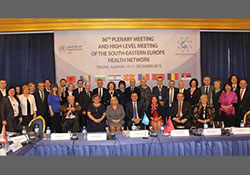Universal health coverage top of agenda for South-eastern Europe Health Network

Ministry of Health, Albania
"Universal health coverage is a foundation stone for preventing poverty and addressing inequities. Health is a right. We have addressed health coverage throughout the history of the network, from the Dubrovnik Pledge, the Banja Luka Pledge, through to the South-eastern Europe 2020 Strategy," said Ilir Beqaj, Minister of Health of Albania, at the opening of the 36th plenary and high-level meeting of the South-eastern Europe Health Network (SEEHN), held in Tirana, Albania, on 10–11 December 2015.
Ministers and high-level officials from the 9 SEEHN member states – Albania, Bosnia and Herzegovina, Bulgaria, Israel, Montenegro, the Republic of Moldova, Romania, Serbia and the former Yugoslav Republic of Macedonia – met to discuss cooperation on health in the subregion, address current challenges and focus on realizing universal health coverage.
Minister Beqaj underlined the benefits of cooperation in the sub-region, which are particularly important for addressing issues such as migration, disasters and emergencies, and climate change. He noted that the Albanian Presidency of the network, during the second half of 2015, had undertaken an ambitious programme of technical implementation.
Representing WHO/Europe, Dr Lucianne Licari, Executive Manager, Country Relations and Corporate Communications, said that the SEEHN has a unique opportunity to become a role model in achieving sustainable development by using intersectoral approaches to health and pursuing universal health coverage. Dr Licari emphasized that WHO/Europe would provide support to the network at all levels – political, strategic and technical.



